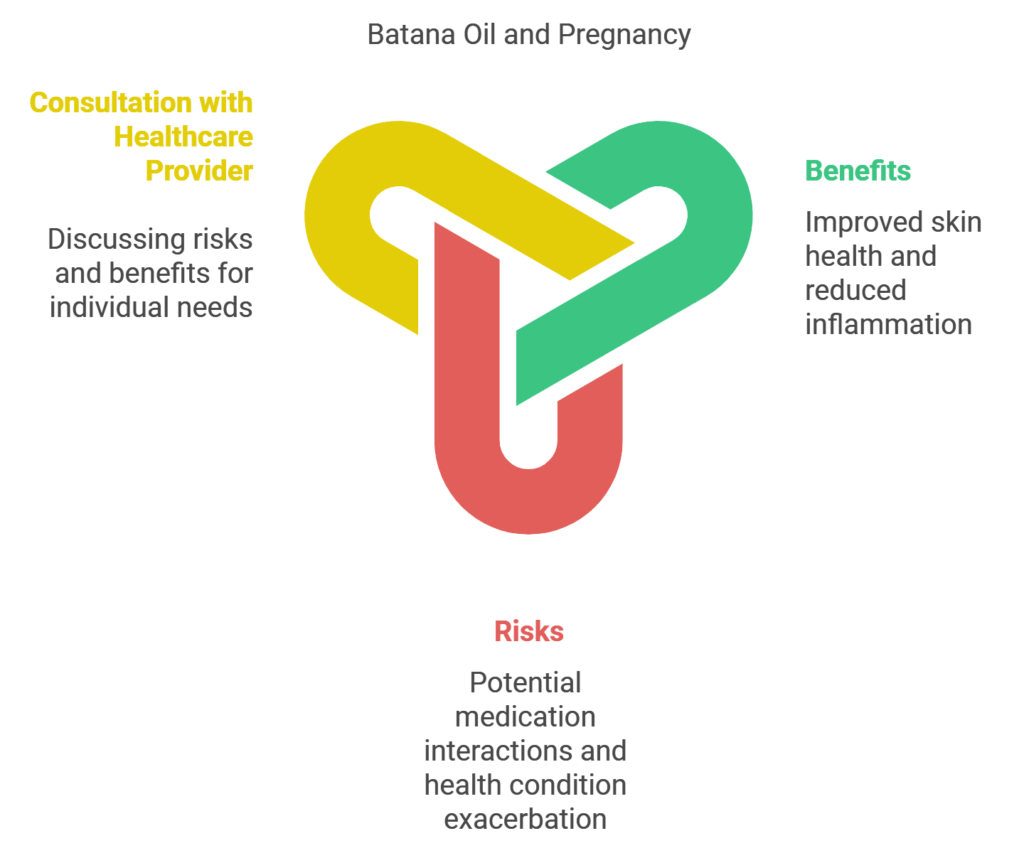With your pregnancy journey, it’s important to consider every product you use, including batana oil. Known for its nourishing properties for skin and hair, you may wonder if it’s safe during this sensitive time.
While batana oil is generally regarded as natural and beneficial, it’s important to consult with your healthcare provider, as individual reactions can vary. This blog post will help you understand the potential effects and guide you in making informed decisions about incorporating batana oil into your prenatal care routine.

Key Takeaways:
- Consultation Recommended: It is important for pregnant women to consult with a healthcare provider before using batana oil to ensure safety for both mother and baby.
- Potential Allergies: Some individuals may experience allergic reactions to batana oil, making it necessary to perform a patch test prior to full use during pregnancy.
- Quality Matters: Choosing high-quality batana oil from reputable sources can reduce the risk of contaminants that might be harmful during pregnancy.
Table of Contents
Understanding Batana Oil
Your interest in batana oil reflects a growing awareness of natural products and their potential benefits. This oil, derived from the nuts of the American palm tree, is renowned for its rich nutrient content and cosmetic applications.
Its extraordinary properties may offer various advantages for skin and hair health, making it a popular choice among those seeking organic solutions. Understanding batana oil’s origins, extraction methods, and nutritional benefits is necessary to determine its suitability, especially during pregnancy.
Origin and Extraction
One of the most fascinating aspects of batana oil is its origin, sourced primarily from the indigenous regions of Central America. The extraction process involves cold-pressing the nut, which helps retain its nutrients and integrity.
This method ensures that you receive a pure and potent oil that can be embraced for both aesthetic and health purposes.
Nutritional Profile
About batana oil, it is celebrated for its impressive nutritional profile, loaded with necessary fatty acids, vitamins, and antioxidants. This combination supports skin hydration, promotes healing, and enhances overall vitality.
Additionally, the presence of oleic acid contributes to its moisturizing properties, while vitamin E acts as an antioxidant, protecting against free radicals.
Due to its rich content of nutrients, batana oil can be beneficial in nourishing both skin and hair. Its high levels of fatty acids, particularly oleic acid and linoleic acid, support effective moisture retention, making it an excellent choice for dry or damaged hair.
how to use batana oil for alopecia
is batana oil comedogenic
Benefits of Batana Oil
Some of the notable benefits of batana oil include its ability to improve hair growth, enhance skin health, and provide important nutrients. This oil, derived from the fruit of the American palm tree, is rich in vitamins and fatty acids, making it a popular choice for those seeking natural beauty solutions. Its moisturizing properties make it ideal for both skin and hair, encouraging a healthy glow and vibrant look.
Skin and Hair Health
One of the key benefits of batana oil lies in its ability to nourish and hydrate your skin and hair. Regular application can lead to increased moisture retention, improved elasticity, and a significant reduction in dryness. This powerful oil also promotes hair growth by strengthening the hair shaft, minimizing breakage, and reducing frizz for a sleek appearance.
Nutritional Advantages
Across various aspects of nutrition, batana oil shines as a beneficial addition to your diet. Its nutrient profile includes important fatty acids and vitamins A, C, and E, which play a vital role in maintaining your overall health. These nutrients can enhance your immune system, improve skin health, and provide antioxidants that combat free radicals in your body.
Further emphasizing batana oil’s significance, it offers anti-inflammatory properties and can support heart health when used in moderation as part of your diet.
Loaded with oleic acid, it can help manage your cholesterol levels, while the presence of antioxidants may protect your cells from damage. Incorporating batana oil into your meals provides not just flavor, but also an array of nutritional benefits that promote your overall well-being.
Safety Considerations During Pregnancy

To ensure the well-being of both you and your baby, it is imperative to evaluate the safety of all products you use during pregnancy, including batana oil. Consulting your healthcare provider is a wise step to take before incorporating any new oils or supplements into your routine. Keeping informed about the ingredients and their potential effects on pregnancy will help you make educated decisions that support your health.
Potential Risks
To mitigate any potential risks, it is vital to understand that certain imperative oils can cause skin irritation or allergic reactions. In addition, batana oil’s effects on hormonal balance during pregnancy are not extensively studied, leading to uncertainty regarding its safety. Always prioritize caution and consult with your physician if you have concerns.
Recommended Usage
Safety guidelines suggest that if you choose to use batana oil during pregnancy, you should do so in moderation. Start with a patch test to identify any adverse reactions on your skin. It is advisable to dilute the oil with a carrier oil to minimize potential irritation. Furthermore, restrict its usage to topical application rather than ingestion.
Considerations include using batana oil in limited amounts and ensuring it is diluted properly to prevent skin irritations. Always perform a patch test before applying it to larger areas of your body.
If you experience any adverse reactions, discontinue use immediately. Maintaining open communication with your healthcare provider can further guide you on the safe application of batana oil during your pregnancy journey.
is batana oil safe during pregnancy Expert Opinions

For many women, the safety of using batana oil during pregnancy is a pressing concern. Experts in various fields have shared their insights on the potential benefits and risks associated with this oil, allowing you to make a more informed decision regarding its use.
Dermatologists’ Views
Expert advice from dermatologists suggests that while batana oil is generally safe for topical use, you should always conduct a patch test first. They acknowledge its moisturizing properties but recommend consulting with your healthcare professional to avoid any adverse reactions.
Obstetricians’ Recommendations
By understanding the specific needs and concerns during pregnancy, obstetricians emphasize caution when using batana oil. They advise that you should consult your doctor before incorporating any new products into your routine.
In addition, obstetricians note that while batana oil may contain nourishing properties beneficial for skin and hair, its potential for allergens means that your individual reactions can vary.
Therefore, they strongly recommend avoiding any product that causes irritation or discomfort. Prioritizing your health and that of your baby by seeking professional advice before use can ensure that you are making a safe choice.
Alternative Oils During Pregnancy

Once again, it’s crucial to consider alternatives as you navigate the world of oils during your pregnancy. Several oils can provide benefits while ensuring safety for both you and your baby. It’s advisable to choose options that are known for their gentle properties and positive effects on skin and health during this significant time.
Safe Options
Among the oils deemed safe for use during pregnancy, options such as coconut oil, sweet almond oil, and jojoba oil stand out. These oils are not only beneficial for skin hydration and relaxation but also have minimal risk for allergic reactions, making them ideal choices as you prioritize safety.
Oils to Avoid

Before you consider including any new oils in your routine, it’s vital to understand which ones to steer clear of during pregnancy. Certain oils may pose risks or lead to unwanted side effects.
Plus, some oils are better left unused during pregnancy due to potential risks they carry. For instance, oils such as crucial oils like rosemary, sage, and clary sage can lead to uterine contractions or other complications.
Always consult with your healthcare provider to ensure that any oil you plan to use is safe and appropriate for your situation, preventing any adverse effects both for you and your baby.
Personal Experiences and Anecdotes

Many women share their experiences with batana oil during pregnancy, highlighting varying opinions on its benefits and potential risks. Some find it a valuable natural remedy for skin hydration and nourishment, while others express concern over its use during this sensitive time.
Personal stories can provide insight, but it’s necessary to consult with healthcare professionals before making any decisions, as your unique health circumstances matter significantly.
Testimonials from Pregnant Women

One expectant mother reported that incorporating batana oil into her skincare routine helped alleviate dryness and stretch marks. She appreciated its natural properties and felt comfortable using it after discussing it with her doctor. Her experience reflects a growing trend among pregnant women seeking more holistic approaches to skincare.
Cultural Perspectives on Batana Oil
Against the backdrop of traditional practices, batana oil holds cultural significance in various communities. Many cultures have long used this oil for its nourishing properties, believing it promotes not only skin health but also overall well-being during pregnancy.
It’s commonplace to find women in these cultures applying batana oil with the understanding that it embodies both the wisdom of ancestral practices and the natural benefits derived from the oil.
With roots in indigenous traditions, batana oil is often regarded as a symbol of health and well-being in various communities. Pregnant women may use it for its potential to enhance skin elasticity and moisture levels, thereby reducing the appearance of stretch marks.
Cultural practices surrounding batana oil emphasize the importance of natural ingredients in maintaining skin health. However, it’s vital to consider any possible allergens or sensitivities unique to your situation, as what is deemed safe in one culture may not be universally applicable to all pregnant individuals.
To wrap up

In conclusion, batana oil may offer several benefits for pregnant women, including improved skin health and reduced inflammation. However, it’s essential to use it responsibly and under the guidance of a healthcare professional, as it can interact with certain medications and exacerbate underlying health conditions.
If you’re considering using batana oil during pregnancy, be sure to consult with your healthcare provider to discuss the potential risks and benefits and determine the best course of treatment for your individual needs.
FAQ
Is batana oil safe to use during pregnancy?
It’s likely safe but check with your doctor first. Hormonal changes can make skin react differently. Always opt for pure, additive-free oil. Better safe than sorry!
What are the benefits of using batana oil during pregnancy?
It hydrates dry skin. Reduces stretch marks. Boosts elasticity. Perfect for managing pregnancy skin changes. Do a patch test to be sure it works for you.
Are there any side effects during pregnancy?
Irritation or allergies can happen, especially with sensitive skin. Watch for redness or itching. Stop use if something feels off. Always consult your doctor!

